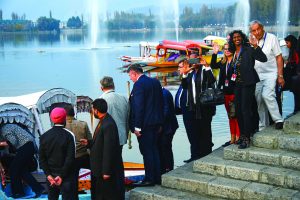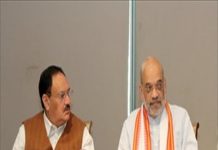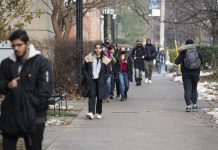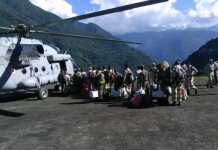 Is the Centre mulling to grant Article 371 for the newly created Union Territory of Jammu and Kashmir as a compensation for the revocation of Article 370 which granted the erstwhile state its partial autonomous status within Indian Union. And is a small group of Kashmiri leaders willing to settle for this? There is no clarity as of now but speculations to this effect are doing the rounds in Kashmir ever since the surprise meeting with the visiting European Union delegation by three Kashmir leaders: Muzaffar Hussain Beigh, Altaf Bukhari and Usmaan Majid.
Is the Centre mulling to grant Article 371 for the newly created Union Territory of Jammu and Kashmir as a compensation for the revocation of Article 370 which granted the erstwhile state its partial autonomous status within Indian Union. And is a small group of Kashmiri leaders willing to settle for this? There is no clarity as of now but speculations to this effect are doing the rounds in Kashmir ever since the surprise meeting with the visiting European Union delegation by three Kashmir leaders: Muzaffar Hussain Beigh, Altaf Bukhari and Usmaan Majid.
Beigh, a former J&K Deputy Chief Minister, is a top PDP leader. Bukhari, a former J&K Finance Minister, is a former PDP leader and Majid is a Congress leader.
They met the EU delegation in New Delhi in their capacity as Kashmiri political representatives. It was seen as a coup of sorts by New Delhi to get them to meet the EU delegation at a time when most Kashmiri leaders are under detention following scrapping of Article 370. Ever since talk of these leaders bargaining for grant of Article 371 has Kashmir abuzz. Local papers have prominently carried reports on the alleged efforts by these leaders. And Beigh too lent credence to these reports by issuing a statement that Article 370 was indeed the goal of their activities.
“We are a hill state and the Constitution has provided special provisions under Article 371 for all the hill states with domicile rights like those they enjoyed under Article 35A,” Beigh said in an interview to a news agency.
However, there is a catch here. And this is about Beigh’s locus standi to propose Article 370 for J&K. Beigh is a patron of the PDP but it is not clear whether he enjoys the blessing of his party in pressing the demand. PDP president Mehbooba Mufti is in jail. But her daughter Iltija Mufti is free and she has also been able to tweet on behalf of her mother, being in touch with her through a phone. But no tweet from her showing either support or disapproval for Beigh’s activities has been posted so far.
But at the same time, it is difficult to dissociate Beigh from the PDP. He is the founder member of the PDP and will be perceived as speaking for it unless the party expressly distances itself from him. But this hasn’t happened so far, at least as forcefully as it is expected. And this is creating suspicion in the minds of people in the Valley. Questions are being raised whether Beigh is acting on behalf of Mehbooba or on his own. And if independently, why isn’t party washing its hands of him.
New politics?
There is another way of looking at it. And it is that by mooting the idea of Article 371 for J&K, Beigh is trying to draw the contours of post Article 370 Kashmir politics. The effort is still tentative in nature and it is unlikely to find any resonance in Kashmir in the short term. The Valley has been observing shutdown against the repeal of Article 370 over the past more than three months. Public transport has been off the roads. The shock of sudden loss of partial autonomy is yet to sink in. Major leaders which include three former chief ministers — Dr Farooq Abdullah, Omar Abdullah and Mehbooba Mufti — are still under detention. And which means these leaders haven’t warmed to the idea of Article 371. And in their absence, the idea is also unlikely to find any traction among the majority of people in the newly created union territory.
But as the situation is unfolding, it is very much possible that the new political reality in Kashmir will beget new faces. And they will go to people with new issues. And it is here that the demand for Article 371 will come handy. It will give new politics in the state its rationale. And that the major leaders like Beigh and Bukhari appear inclined to be a part of the post- Article 370 politics shows that New Delhi has managed to lay the foundation of a new Kashmir politics.
Still in its fledgling state, this new politics faces a challenging and uncertain future ahead. For one, it remains to be seen how parties like National Conference, the PDP and even Sajad Gani Lone’s People’s Conference respond to it. With their top leaders in jail, there’s no clarity on their future course of action.
They have so far bitterly opposed the repeal of the state’s special status and vowed to fight for its restoration. In the run up to the abrogation of the Article 370 on August 5, all mainstream parties had closed ranks against such an occurrence but to no avail.
Once released, these politicians could also decide to unite and launch a mass movement for the reversal of the Article 370 revocation. Considering the mood in the Valley, such a movement is likely to witness an overwhelming public participation. Should this happen, the long running movement for freedom will meld with the struggle for the restoration of special rights under India’s constitution. For once, both separatists and unionists may define their politics in adversarial terms to New Delhi, if not sharing the same platform. And this can pose New Delhi its biggest challenge in Kashmir. For the first time in seventy years, it may find no Kashmiri leader is on its side in the state”.
But should New Delhi choose to indefinitely extend the stay of these leaders in jail, this will allow new political actors a space to flesh out their politics. The credibility, however, of such a politics looks moot.
One area where a politics revolving around the demand for Article 371 could strike a chord is in seeking to address deep concerns in Kashmir about the demographic change. But for that to happen, the new political noise around Article 371 will need a degree of responsiveness from New Delhi too. And this hasn’t happened so far. After doing away with Article 370, New Delhi has adopted a sphinx-like silence on the state. Its entire energy is focussed on maintaining law and order in the state and ensuring no mass protests take place against the revocation of Article 370. It has yet to try a political outreach or signal it is ready to make some accommodation with Kashmiri demands. And considering the immense popularity of scrapping of Article 370 across the country, the space for New Delhi to make some political concessions to Kashmir is drastically limited. But the centre will certainly like to see the prominent mainstream political actors like Abdullah, Omar and Mehbooba back on Kashmir’s political scene but on its terms. The demand for statehood and some small concessions like letting jobs in the UT government remain restricted to residents only are likely to be acceptable to New Delhi. But as things stand, it is still premature to speculate about the course Kashmir politics will take in weeks and months to come.
letters@tehelka.com













